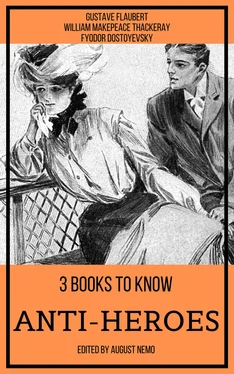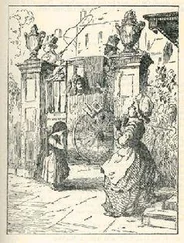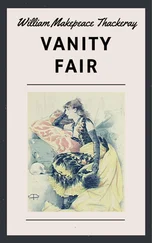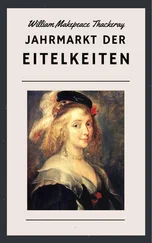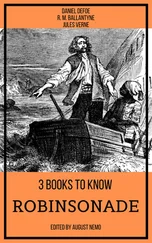The county of Devon is not so lucky as the neighbouring county of Cornwall, and has not the share of representatives which the latter possesses; where I have known a moderate country gentleman, with a few score of hundreds per annum from his estate, treble his income by returning three or four Members to Parliament, and by the influence with Ministers which these seats gave him. The parliamentary interest of the house of Lyndon had been grossly neglected during my wife’s minority, and the incapacity of the Earl her father; or, to speak more correctly, it had been smuggled away from the Lyndon family altogether by the adroit old hypocrite of Tiptoff Castle, who acted as most kinsmen and guardians do by their wards and relatives, and robbed them. The Marquess of Tiptoff returned four Members to Parliament: two for the borough of Tippleton, which, as all the world knows, lies at the foot of our estate of Hackton, bounded on the other side by Tiptoff Park. For time out of mind we had sent Members for that borough, until Tiptoff, taking advantage of the late lord’s imbecility, put in his own nominees. When his eldest son became of age, of course my Lord was to take his seat for Tippleton; when Rigby (Nabob Rigby, who made his fortune under Clive in India) died, the Marquess thought fit to bring down his second son, my Lord George Poynings, to whom I have introduced the reader in a former chapter, and determined, in his high mightiness, that he too should go in and swell the ranks of the Opposition—the big old Whigs, with whom the Marquess acted.
Rigby had been for some time in an ailing condition previous to his demise, and you may be sure that the circumstance of his failing health had not been passed over by the gentry of the county, who were staunch Government men for the most part, and hated my Lord Tiptoff’s principles as dangerous and ruinous, ‘We have been looking out for a man to fight against him,’ said the squires to me; ‘we can only match Tiptoff out of Hackton Castle. You, Mr. Lyndon, are our man, and at the next county election we will swear to bring you in.’
I hated the Tiptoffs so, that I would have fought them at any election. They not only would not visit at Hackton, but declined to receive those who visited us; they kept the women of the county from receiving my wife: they invented half the wild stories of my profligacy and extravagance with which the neighbourhood was entertained; they said I had frightened my wife into marriage, and that she was a lost woman; they hinted that Bullingdon’s life was not secure under my roof, that his treatment was odious, and that I wanted to put him out of the way to make place for Bryan my son. I could scarce have a friend to Hackton, but they counted the bottles drunk at my table. They ferreted out my dealings with my lawyers and agents. If a creditor was unpaid, every item of his bill was known at Tiptoff Hall; if I looked at a farmer’s daughter, it was said I had ruined her. My faults are many, I confess, and as a domestic character, I can’t boast of any particular regularity or temper; but Lady Lyndon and I did not quarrel more than fashionable people do, and, at first, we always used to make it up pretty well. I am a man full of errors, certainly, but not the devil that these odious backbiters at Tiptoff represented me to be. For the first three years I never struck my wife but when I was in liquor. When I flung the carving-knife at Bullingdon I was drunk, as everybody present can testify; but as for having any systematic scheme against the poor lad, I can declare solemnly that, beyond merely hating him (and one’s inclinations are not in one’s power), I am guilty of no evil towards him.
I had sufficient motives, then, for enmity against the Tiptoffs, and am not a man to let a feeling of that kind lie inactive. Though a Whig, or, perhaps, because a Whig, the Marquess was one of the haughtiest men breathing, and treated commoners as his idol the great Earl used to treat them—after he came to a coronet himself—as so many low vassals, who might be proud to lick his shoe-buckle. When the Tippleton mayor and corporation waited upon him, he received them covered, never offered Mr. Mayor a chair, but retired when the refreshments were brought, or had them served to the worshipful aldermen in the steward’s room. These honest Britons never rebelled against such treatment, until instructed to do so by my patriotism. No, the dogs liked to be bullied; and, in the course of a long experience, I have met with but very few Englishmen who are not of their way of thinking.
It was not until I opened their eyes that they knew their degradation. I invited the Mayor to Hackton, and Mrs. Mayoress (a very buxom pretty groceress she was, by the way) I made sit by my wife, and drove them both out to the races in my curricle. Lady Lyndon fought very hard against this condescension; but I had a way with her, as the saying is, and though she had a temper, yet I had a better one. A temper, psha! A wild-cat has a temper, but a keeper can get the better of it; and I know very few women in the world whom I could not master.
Well, I made much of the mayor and corporation; sent them bucks for their dinners, or asked them to mine; made a point of attending their assemblies, dancing with their wives and daughters, going through, in short, all the acts of politeness which are necessary on such occasions: and though old Tiptoff must have seen my goings on, yet his head was so much in the clouds, that he never once condescended to imagine his dynasty could be overthrown in his own town of Tippleton, and issued his mandates as securely as if he had been the Grand Turk, and the Tippletonians no better than so many slaves of his will.
Every post which brought us any account of Rigby’s increasing illness, was the sure occasion of a dinner from me; so much so, that my friends of the hunt used to laugh and say, ‘Rigby’s worse; there’s a corporation dinner at Hackton.’
It was in 1776, when the American war broke out, that I came into Parliament. My Lord Chatham, whose wisdom his party in those days used to call superhuman, raised his oracular voice in the House of Peers against the American contest; and my countryman, Mr. Burke—a great philosopher, but a plaguy long-winded orator—was the champion of the rebels in the Commons—where, however, thanks to British patriotism, he could get very few to back him. Old Tiptoff would have sworn black was white if the great Earl had bidden him; and he made his son give up his commission in the Guards, in imitation of my Lord Pitt, who resigned his ensigncy rather than fight against what he called his American brethren.
But this was a height of patriotism extremely little relished in England, where, ever since the breaking out of hostilities, our people hated the Americans heartily; and where, when we heard of the fight of Lexington, and the glorious victory of Bunker’s Hill (as we used to call it in those days), the nation flushed out in its usual hot-headed anger. The talk was all against the philosophers after that, and the people were most indomitably loyal. It was not until the land-tax was increased, that the gentry began to grumble a little; but still my party in the West was very strong against the Tiptoffs, and I determined to take the field and win as usual.
The old Marquess neglected every one of the decent precautions which are requisite in a parliamentary campaign. He signified to the corporation and freeholders his intention of presenting his son, Lord George, and his desire that the latter should be elected their burgess; but he scarcely gave so much as a glass of beer to whet the devotedness of his adherents: and I, as I need not say, engaged every tavern in Tippleton in my behalf.
There is no need to go over the twenty-times-told tale of an election. I rescued the borough of Tippleton from the hands of Lord Tiptoff and his son, Lord George. I had a savage sort of satisfaction, too, in forcing my wife (who had been at one time exceedingly smitten by her kinsman, as I have already related) to take part against him, and to wear and distribute my colours when the day of election came. And when we spoke at one another, I told the crowd that I had beaten Lord George in love, that I had beaten him in war, and that I would now beat him in Parliament; and so I did, as the event proved: for, to the inexpressible anger of the old Marquess, Barry Lyndon, Esquire, was returned member of Parliament for Tippleton, in place of John Rigby, Esquire, deceased; and I threatened him at the next election to turn him out of BOTH his seats, and went to attend my duties in Parliament.
Читать дальше
